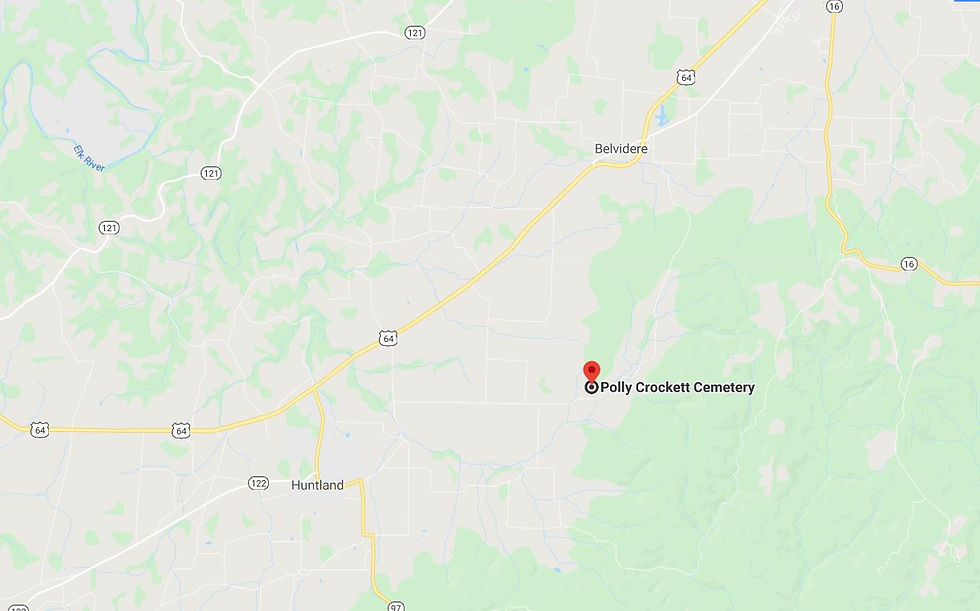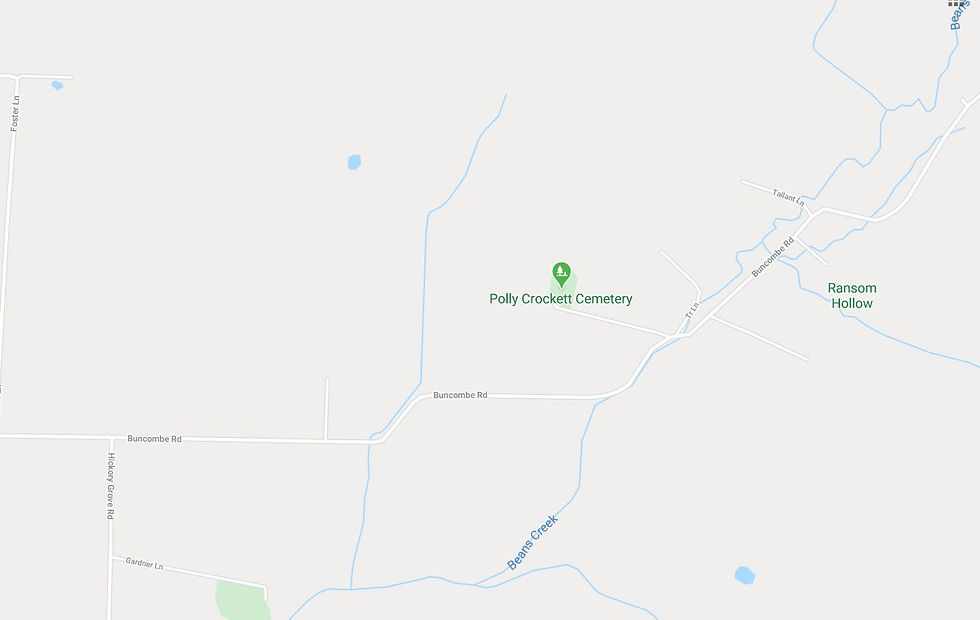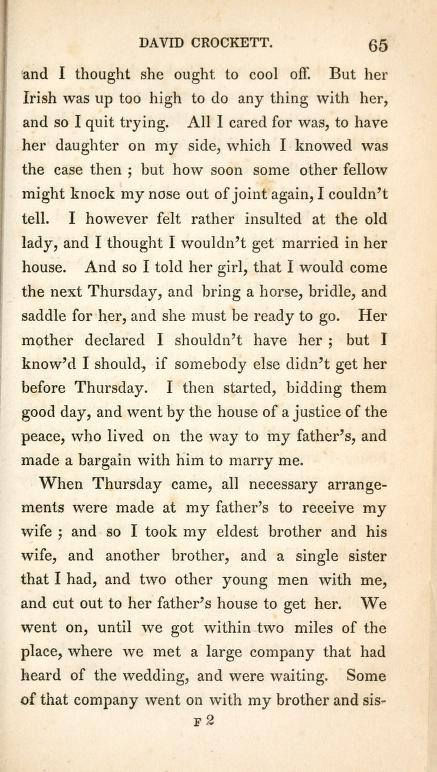Off the Beaten Path in T.A.G. - Polly Crockett Cemetery
- May 26, 2020
- 7 min read
Updated: Dec 9, 2022

While there are many stories and tales about the legendary frontiersman, hunter and US Congressman David "Davy" Crockett from Tennessee, there are few about his first wife Mary Finlay (Finley) of Jefferson County, Tennessee. Davy & Polly met at a frontier social event and in his autobiography, Davy recalled that Polly looked sweeter than sugar. They fell in love and were married Aug. 16, 1806 at Finley’s Gap, Jefferson, Tn.
Mary “Polly” Finley was born January 4, 1788, the year that the American Constitution was ratified, and George Washington was elected as our first President. She was the fourth of seven children and the first of two daughters born to Scot-Irish immigrants William and Jean Kennedy Finley and she was nicknamed “Polly” by her father. Polly was born in what we now call East Tennessee, in the proposed state of Franklin which did not succeed in actually becoming a state but was also the year the thirteen independent states became the United States of America.
Polly’s early childhood years would have been typical of the time frame, frontier life. She was raised in a cabin where families lived far apart but there were still primitive schools and churches. Most of the activities and get togethers were for church ceremonies, barn raising and harvesting crops. During harvest there were oftentimes evening parties that gave the young folks the opportunity to meet each other. It was at one of the gatherings that Polly met her future husband, Davy Crockett who was a resident of nearby Greene County. According to legend, it was love at first sight for Davy and Polly and they married one year later on August 12, 1806 in her parents home when he was 20 and she was 18 years old.
Davy & Polly lived in East Tennessee for several years on a small rented farm at Bay’s Mountain near Finlay’s Spring settlements of Polly’s Father. They struggled to make ends meet and Davy was convinced their best hope was to move west to more fertile land. In 1811, they made the long 150-mile trek over the Cumberland Mountain plateau to the headwaters of Mulberry Creek, a branch of the Elk River in Moore County. They then moved to a territory which straddles Franklin and Lincoln counties near the Alabama state line, where Davy marked his initials on a beech tree and laid out a five acre claim on Tennessee state land and laid out a claim. Their new home on Beans Creek was within view of his beloved mountains and hunting grounds.
During their time living in Southern Tennessee the Creek Indian War and the War of 1812 had begun. Davy volunteered as a mounted gunman for two enlistments in General Andrew Jackson’s brutal campaign against the Creek Indians; Fort Strother and Fort Taladega and encountering British troops in the Florida campaign. This left a pregnant Polly at home to raise their two sons and while he was away, Polly was left to take care of all the tasks of owning a home front including safeguarding their children, tending to livestock, farming and foraging.
Davy and Polly Crockett had three children: John, William, and Margaret. Caring for a young family alone on the frontier took its toll on young Polly. The many home moves and natural hardships she faced during cold and wet winters on the frontier zapped her energy and strength. While Davy was home from his second enlistment and several months after giving birth to their daughter Margaret, Polly died on June 11, 1815 at the age of 27. While no cause of death was established it is believed it may have been typhoid or cholera. Davy buried Polly on a hill near their cabin on their property.
For 141 years, there was only a cairn to mark Polly’s grave. In 1956, following the renewal of Davy Crockett’s fame, the Tennessee Historical Commission placed a new granite headstone at her grave.
Eventually Davy married again, and the second wife Elizabeth lived many years after Davy's death at the Alamo. Most of Davy Crockett's storied achievements that helped bring him fame happened after Polly's death. When the second wife died, her gravesite was adorned as the wife of a famous hero, complete with a marble headstone and a statue. By comparison, Polly was buried in a location that time almost forgot. Eventually, the Tennessee Historical Commission erected the larger marker seen in the photos below as well as a roadside historical marker where US 64 passes a couple of miles away.
To honor the spirit of frontierswoman Polly Crockett, for 32 years (1983-2014) the Franklin County Chamber of Commerce held a festival called the “Polly Crocket Festival”. The festival featured over 100 arts & crafts vendors, storytellers, a cornhole competition, skillet toss competition, firing cannons, live demonstrations, horse & buggy rides and more.
The Polly Crockett Cemetery is located in between Huntland and Cowan on Polly Crockett Lane. A quick Google Maps search and you can find directions on how to get there.















DAVID CROCKETT'S WEDDING TO POLLY FINLEY, AUGUST 1806.
At our next meeting we set the day for our wedding; and I went to my father's, and made arrangements for an infair, and returned to ask her parents for her. When I got there, the old lady appeared to be mighty wrathy; and when I broached the subject, she looked at me as savage as a meat axe. The old man appeared quite willing, and treated me very clever. But I hadn't been there long, before the old woman as good as ordered me out of her house. I thought I would put her in mind of old times, and see how that would go with her. I told her she had called me her son-in-law before I had attempted to call her my mother-in-law and I thought she ought to cool off. But her Irish was up too high to do anything with her, and so I quit trying. All I cared for was, to have her daughter on my side, which I knowed was the case then; but how soon some other fellow might knock my nose out of joint again, I couldn't tell. I however felt rather insulted at the old lady, and I thought I wouldn't get married in her house. And so I told her girl, that I would come the next Thursday, and bring a horse, bridle, and saddle for her, and she must be ready to go. Her mother declared I shouldn't have her; but I know'd I should, if somebody else didn't get her before Thursday. I then started, bidding them good day, and went by the house of a justice of the peace, who lived on the way to my father's, and made a bargain with him to marry me.
When Thursday came, all necessary arrangements were made at my father's to receive my wife; and so I took my eldest brother and his wife, and another brother, and a single sister that I had, and two other young men with me, and cut out to her father's house to get her. We went on, until we got within two miles of the place, where we met a large company that had heard of the wedding, and were waiting. Some of that company went on with my brother and sister, and the young man I had picked out to wait on me. When they got there, they found the old lady as wrathy as ever. However the old man filled their bottle, and the young men returned in a hurry. I then went on with my company, and when I arrived I never pretended to dismount from my horse, but rode up to the door, and asked the girl if she was ready; and she said she was. I then told her to light on the horse I was leading; and she did so. Her father, though, had gone out to the gate, and when I started he commenced persuading me to stay and marry there; that he was entirely willing to the match, and that his wife, like most women, had entirely too much tongue; but that I oughtn't to mind her. I told him if she would ask me to stay and marry at her house, I would do so. With that he sent for her, and after they had talked for some time out by themselves, she came to me and looked at me mighty good, and asked my pardon for what she had said, and invited me stay. She said it was the first child she had ever had to marry; and she couldn't bear to see her go off in that way; that if I would light, she would do the best she could for us. I couldn't stand everything, and so I agreed, and we got down, and went in. I sent off then for my parson, and got married in a short time; for I was afraid to wait long, for fear of another defeat. We had as good treatment as could be expected; and that night all went on well.
The next day we cut out for my father's, where we met a large company of people, that had been waiting a day and a night for our arrival. We passed the time quite merrily, until the company broke up; and having gotten my wife, I thought I was completely made up, and needed nothing more in the whole world. But I soon found this was all a mistake--for now having a wife, I wanted everything else; and, worse than all, I had nothing to give for it.
I remained a few days at my father's, and then went back to my new father-in-law's; where, to my surprise, I found my old Irish mother in the finest humour in the world.
She gave us two likely cows and calves, which, though it was a small marriage-portion, was still better than I had expected, and, indeed, it was about all I ever got. I rented a small farm and cabin, and went to work; but I had much trouble to find out a plan to get anything to put in my house. At this time, my good old friend the Quaker came forward to my assistance, and gave me an order to a store for fifteen dollars' worth of such things as my little wife might choose. With this, we fixed up pretty grand, as we thought, and allowed to get on very well.








Comments